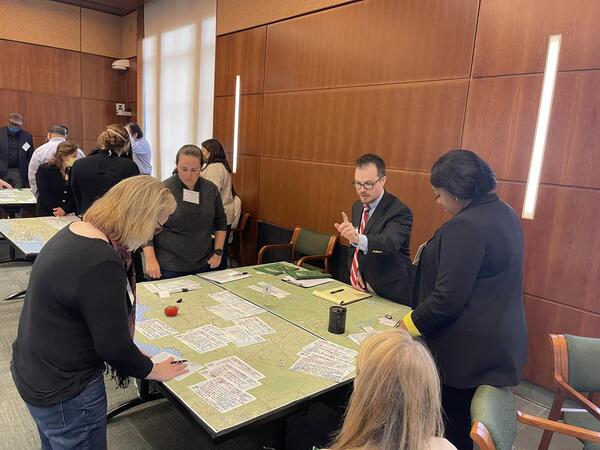
Tammie Moore (right) represented SLCC at Navigating the Energy Transition in the Gulf of Mexico Workshop
South Louisiana Community College’s Tammie Moore recently represented Acadiana, Louisiana, and the Gulf Region at the National Academies of Sciences, Engineering, and Medicine's workshop entitled “Navigating the Energy Transition in the Gulf of Mexico.” Moore, who is the Morgan City and Franklin campuses director, joined 25 representatives from the five gulf states in discussing scenarios for a collaborative and collective approach to achieving net-zero emissions by 2050.
“People from academia were specifically chosen to see how the changing energy landscape will impact different areas of society and how the leaders in those areas will respond. The scenarios we worked through are on the horizon as energy needs diversify,” explains Moore.
Participants from government, industry, academia, and Gulf communities considered strategies to overcome potential challenges and enable opportunities for their areas to thrive in the coming decades. Moore says they looked at the energy landscape in two segments: from now until 2036 and then from 2036 to 2050.

“How will the future of energy impact the people of our area? Who are we going to train, how will we train them, what jobs will they have available? That’s what we were there to explore. For the Morgan City campus specifically, many of our programs feed into the maritime industry and we need to understand what prospects we will have.”
The workshop emphasized the importance of workforce development, government, and industry investment in achieving decarbonization goals, and the potential impact on communities, industry, and labor resources across the region. Through her role with SLCC, Moore is dedicated to training employees of the future and staying ahead of industry trends. She says this is an opportunity to be on the forefront of what is coming to the Gulf Region.
“The oil and gas industry will continue to be a major player for us here in Louisiana, but energy needs are diversifying; at SLCC we stay ahead of the curve. With conferences like this we can see what the future holds and begin to train our workforce.”

Moore plans to put her knowledge and experience to good use exploring how to train workers and prepare the Acadiana community for the future.
“What’s important for education and specifically community colleges to remember is that this begins with us; we train the future workforce for our community. Right now, we are getting projections based on industry trends and other factors, we need to take that data and be prepared to train for what will be needed.”
Moore will represent SLCC and the Gulf Region once again this February. She’s been invited to the Gulf Research Program’s Division Committee meeting at Rice University in Houston to speak about her experience participating in the “Navigating the Energy Transition in the Gulf of Mexico” workshop.
